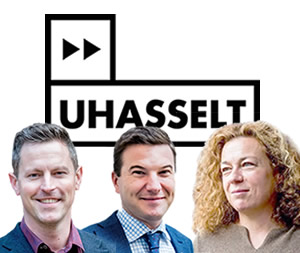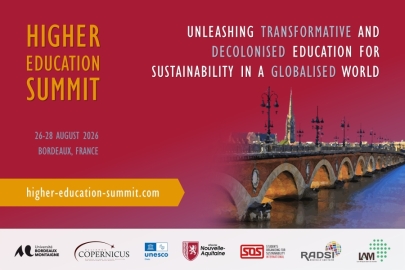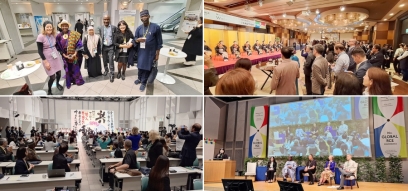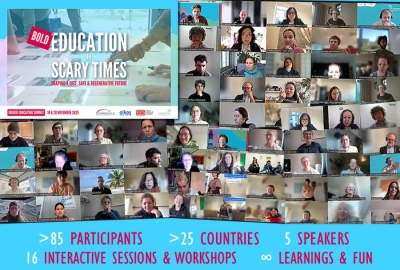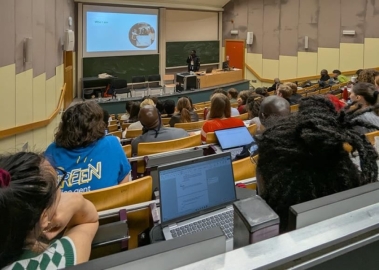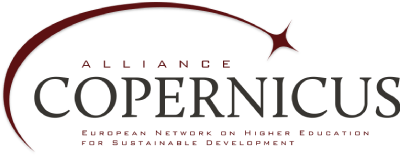#10 09/2022
Hasselt University
Tom Kuppens (Asst. Prof. Education for Sustainable Development)
Bernard Vanheusden (Rector)
Griet Verbeeck (Sustainability coordinator)
| _ |
"To face sustainability challenges, it is crucial for students to develop sustainability competences." |
COPERNICUS Alliance (CA) As the new rector of UHasselt, you introduced sustainability as one of the four transversal policy themes of your university. Why was it so much needed to bring sustainability at the forefront of your university's policies?
Bernard Vanheusden Sustainability is one of the major societal challenges. Universities have to anticipate such challenges, take up a leadership role in society to tackle these challenges. We have to be ready as a university. Therefore, we fully commit ourselves to sustainable development as formulated by the United Nations in the Sustainable Development Goals (SDGs). These 17 goals form the global sustainable development agenda for 2030. However, we are fully aware that the SDGs are criticized because of the focus on economic growth in SDG 8. Therefore, we also use Kate Raworth’s concept of Doughnut Economics, in which the economy is not a goal in itself, but a means to achieve a safe and just space for humanity, as a compass to steer our activities. Hasselt University fully subscribes to the SDGs and is working on a course of action in order to truly be seen as a sustainable university by 2030.
CA Recently, a new policy plan 'Education and student' entered into force for the period 2022-2029. To this end, a new UHasselt competence framework was developed. What is the role of sustainability competences in this framework? How will you make sure that every student acquires those sustainability competences?
Tom Kuppens As a civic university, UHasselt wants its graduates to be able to contribute to addressing complex sustainability challenges. To face sustainability challenges, it is crucial for students to develop sustainability competences that will enable them to work, live and act in a sustainable way in later (professional) life. Sustainability competences have therefore become the starting point of the new UHasselt competency framework. We started from the sustainability competency framework of Ploum et al. (2018) and got further inspired by the Green Comp framework of the European Commission, constantly asking ourselves: ”Which sustainability competences should all our UHasselt students possess when we hand them a diploma?” UHasselt came to a framework of institution-wide competences that we want all our students to master: 'inclusive collaboration', 'ethical and sustainable reflection', 'systems thinking' and 'sustainable action'. In the coming years we will actively support and inspire our teaching staff to include these competences in their courses and programs. This will happen gradually of course: First, we will map out where each course already stands and support the staff in shaping and evaluating sustainability competences at the level of their course. Then we will work on integrating these competences into the learning goals at the program level. Thus, in time, all UHasselt alumni will have acquired sustainability competences during their studies at our university.
CA From 6-8 September, UHasselt hosted the COPERNICUS Alliance's Higher Education Summit 2022. We asked all of our keynotes the following two questions: (1) What is your vision of a "future-proof" economy?, and (2) What needs to be transformed in higher education institutions to contribute to this economy? How would you answer these questions?
Bernard Vanheusden (1) In a very general way one could say that a future-proof economy is an economy according to the models of sustainable development, thus one that "aims to meet the needs of present generations without jeopardizing the ability of future generations to meet their own needs". In that perspective, UHasselt supports the Doughnut Economy model of Kate Raworth, in which the main focus is a holistic view on sustainability while considering the planetary boundaries. From a personal point of view, I believe topics such as health, inclusiveness, equality, environment, energy, circular economy, mobility, climate change, and peace are important drivers for a future-proof economy. People should be able to trust that economic system. Trust is crucial, trust that it is sincerely sustainable and not just greenwashing (e.g. through objective certification).
Griet Verbeeck (2) If higher education institutions actively want to contribute to a future-proof economy, we will constantly need to rethink our curricula, our teaching methods and our ways of introducing sustainability competences to our students. Our programs and educational system in general need to stimulate the development of a sustainable mindset for every student. Given the complexity of current and future societal challenges – particularly when it comes to addressing sustainability challenges – through our programs students must learn how they can contribute to finding solutions to these complex challenges. These solutions will rarely lie in applying knowledge and skills from one discipline. We must therefore train our students in interdisciplinary and even transdisciplinary thinking, working with others, systems thinking so that they can gain insight into the larger system and constantly keep them triggered to critically evaluate existing ideas and rethink them to create even more sustainable solutions etc. This requires new ways of teaching, different didactics, new ways of organizing the curricula, and a shift from lecturing to experiential and transformative learning.
CA Some universities provide specific funding or time (comparable to a sabbatical, but then for education) to change their curricula towards sustainable development. Which initiatives does UHasselt take to support its staff members to transform learning?
Bernard Vanheusden At UHasselt, we can count on a very dedicated teaching staff who have innovative, future-oriented education at heart. Many of them are already closely following the developments in education and come to us with innovative ideas. As we want to stimulate educational innovation as much as possible, our teaching staff can apply for resources to develop their ideas into projects. Each year we launch a call of 225,000 EUR in which professors can submit large and small projects leading to educational innovation. In our latest call, we included a thematic line ‘sustainability for/in education’ to encourage our staff to actively work on the topic with students.
We are also committed to the professionalization of our teachers and we support them with a short coaching program to give sustainability competences a place in their course. Staff members who want additional support can always contact our experts in the central services.
CA Which best practices in Education for Sustainable Development would you identify at UHasselt that you find inspiring for other members of the COPERNICUS Alliance? In other words, which achievements make you really proud as a rector so far?
Bernard Vanheusden I think a best practice is definitely that our education is strongly related to our top research; given that our research focuses for example via the Centre for Environmental Sciences on sustainable development in an interdisciplinary way, automatically much of our educational programs also include courses related to aspects of sustainable development and this also in a multidisciplinary way. This is a major strength of Hasselt University. For example, we recently started programs in Health Care engineering and Materiomics which grew from our interdisciplinary research focuses on developing new, sustainable materials and the need to further develop future-proof value based health care.
Griet Verbeeck A more recent inspiring initiative is the fact that together with our students, we launched our Green Office. In co-creation with our students we are going to set up various initiatives to promote sustainable development. One of our professors also developed a workshop which allows students to acquire sustainability competences by reflecting on the Doughnut Economy model with socioeconomic actors through an art installation.
And I would definitely recommend all members to take a look at our new UHasselt competency framework, based on sustainability competences, of course!
CA Many thanks for this conversation!
Contact Tom Kuppens:

